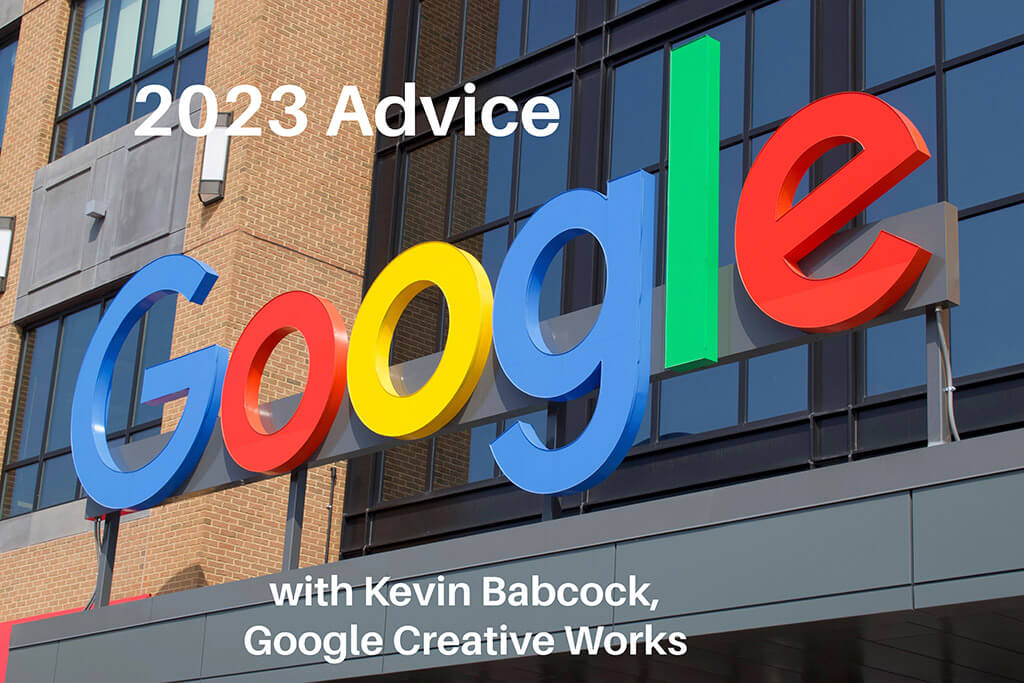By Stephen Boehler with Google’s Kevin Babcock
How can marketers and agencies make the most of the year ahead?
No organization on the planet has more data than Google, and Google’s offerings represent a staple for most modern marketers and their budgets. And Google’s main offering – Search – represents just a fraction of the knowledge the company has been building about what works in marketing and how it works. It pays to leverage what the company has been learning.
To help get 2023 off to a great start, we caught up with Kevin Babcock of Google’s Creative Works team. Kevin leads Creative Partnerships between Google, Brands and Agencies for the Consumer Goods, Government and Entertainment sectors. Belief in creativity as an economic multiplier drives his team’s strategy and approach.
Here’s is what we learned!
What are the key trends that you believe marketers need to be most aware of as we approach the coming year?
Kevin: Creative has never been more important. Especially set against the backdrop of advances in automation and challenging economic times.
Across every study we can source in industry and academia, creative is the dominant driver of ROI. We recently conducted a global study [link] to dig a little deeper into the trends within creative services, and we saw three key trends:
- The Creative Agency Services business is alive and well. By far the largest segment of the marketplace and while relatively flat in terms of y/y growth, this tells us that Brands continue to get an incredible amount of value from the Agency ecosystem.
- The two fastest growing segments of the marketplace seem to be at opposite ends of the creative spectrum: The Creator Economy: democratized brand storytelling, growing 50% y/y. And on the other end: Tech-enabled creative, growing at 10% – 30% y/y. This includes AI oriented creative tools (think: building endemically on a platform), but also platform creative services. Human resources, powered by data.
- The acceleration of these two segments should be seen as collaborators, not a competitive force in the industry. When you zoom out, the most exciting thing for the Creative business is the growth overall in the industry. From 2018 through 2021, the business has grown +6%, a full point faster than media spend.
Ok, so given that, how should brands and agencies leverage these trends?
Kevin: If I’m a brand, I’m asking myself, “how is my orchestration between Agencies, Creators and Tech working for me? Are we as dialed in as we need to be? Are all of our component parts in synchrony? Or do we need to optimize anything in the creative services value chain?”
If I’m an agency, I’m considering whether I want to augment any of my existing offerings to lean into the Creator and/or Tech Enabled space. How can I enhance my brilliant brand storytellers with resources to have even greater impact for my clients?
For both, and we’ve heard this before but it’s even more relevant now given the trends previously mentioned: shift from thinking of Creative as strictly a vertical within your organization and embrace it more horizontally. Across lines of business and departments.

Get insights, ideas and inspiration from Think with Google, here
What can they do to succeed in a period of high inflation?
Kevin: Think full funnel. Every moment is an opportunity for commerce, and thus, an opportunity for storytelling. As many industry academics have concluded: we can’t forsake Brand and emotional connection when sales are the #1 focus. But it’s also important to be as thoughtful about our performance advertising as we are with messages that carry our brand purpose.
But economies of scale matter even more in times like these, right? That’s why we suggest that – in this moment where video and content have come to dominate our lives – if you build for a platform like YouTube first, those assets (:06, :15, Long Form and Vertical) will likely work well across other platforms and linear TV.
The media landscape continues to change and there has been an explosion of properties and media types available to marketers. How can a marketer optimize their effectiveness given these changes?
Kevin: Encourage your Brand and Agencies teams to lean into the available platform Creative Services teams. They exist for a reason. On the Google/YouTube side, effectiveness is our North Star, which for us, begins with identifying the basic levers of success (e.g., best practices) to either adhere to or break with intention. Then, when those relationships have become solid on the foundation of the basics, it’s much easier to pivot and evolve as platform formats and products evolve AND much easier to innovate together. The closer those relationships are, the easier it all becomes, and the more knowledge and expertise is transferred from platform to Marketer.

Stay current on Marketing Strategies from Think with Google, here
What are the most pressing challenges that you are hearing about from marketers? From agencies?
Kevin: The biggest overarching theme has been finding a “future of work” model that can work for each organization, especially in light of the importance of creativity. My hope for everyone is that they’re able to find balance between flexibility and productivity, and I sincerely wish them all luck.
What new or old school marketing tactics may be reaching a tipping point where they become either essential or largely irrelevant?
Kevin: I suppose “storytelling” is as old school as it gets, but I believe it’s never been a better time to be a brand storyteller. The way platforms like YouTube are evolving products to enable better storytelling for Brands and Creators alike has been incredibly exciting over the last 5-6 years. Think about all the places a brand or a Creator can bring their story to life on a platform like YouTube — via a long form video, a podcast, a quick Short, a live stream, It’s truly incredible.
Related, we’ve absolutely reached a tipping point on inclusive marketing. Consumers who see ads as culturally relevant are more than twice as likely to buy from a brand for the first time. It’s a staggering statistic, especially when you consider the buying power of underrepresented groups.
If you were a CMO today, what would you do differently?
Kevin: I suggest this to CMOs and Senior Marketers whenever they ask: rally your agencies and platform partners, clearly communicate expectations around creative excellence, establish basic benchmarks and goals via endemic measurement tools (eg. YouTube BrandLift), and set a cadence to check in and evaluate. The CMOs who have done this have absolutely mastered YouTube. I’m sure other platforms would agree.
The second piece of advice is to get comfortable with even greater levels of experimentation. Whether that’s ingesting platform best practices and translating to your Brand’s style through a series of test-and-learns. Or leaning into the unscripted spaces, where to be successful, brands need to give consumers the tools they need to write the brand’s story. In either case, experimentation is the key.

Stay current on Consumer Insights from Think with Google, here
Knowing what you know today, what advice would you give to 30-year old Kevin?
Kevin: Trust your instincts: Being in it for the work will serve you well in the long term, even if you’re not a creative by trade. Believing in the power of brands, big ideas, great storytelling, and the importance of data are all the right core beliefs for a marketer over the long haul. If at 30, I wasn’t convinced platforms like Google were a place for creativity, I sure as hell am now.
Kevin Babcock, Google Creative Works
As part of Google’s Creative Works team, Kevin Babcock leads Creative Partnerships between Google, Brands and Agencies for the Consumer Goods, Government and Entertainment sectors. Belief in creativity as an economic multiplier drives his team’s strategy and approach. A 7-year Google vet, Kevin spent nearly 15 years at Creative Agencies ranging from BBDO, to Y&R, to Digitas. Originally from West Michigan, Kevin and his family call Chicago home.
Steve Boehler, founder, and partner at Mercer Island Group has led consulting teams on behalf of clients as diverse as Zillow Group, Microsoft, UScellular, Nintendo, Ulta Beauty, Stop & Shop, Qualcomm, Brooks Running, and numerous others. He founded MIG after serving as a division president in a Fortune 100 when he was only 32. Earlier in his career, Steve cut his teeth with a decade in Brand Management at Procter & Gamble, leading brands like Tide, Pringles, and Jif.
